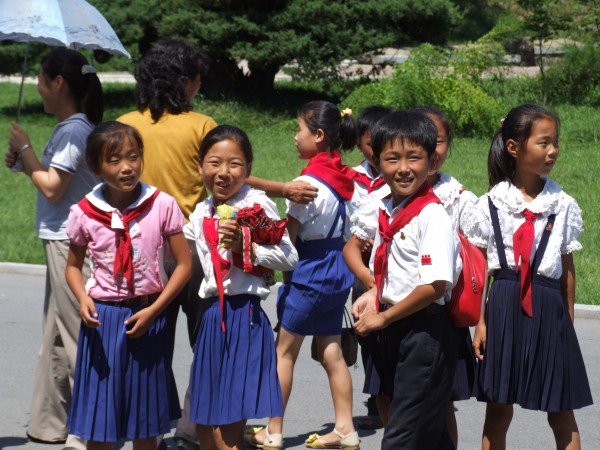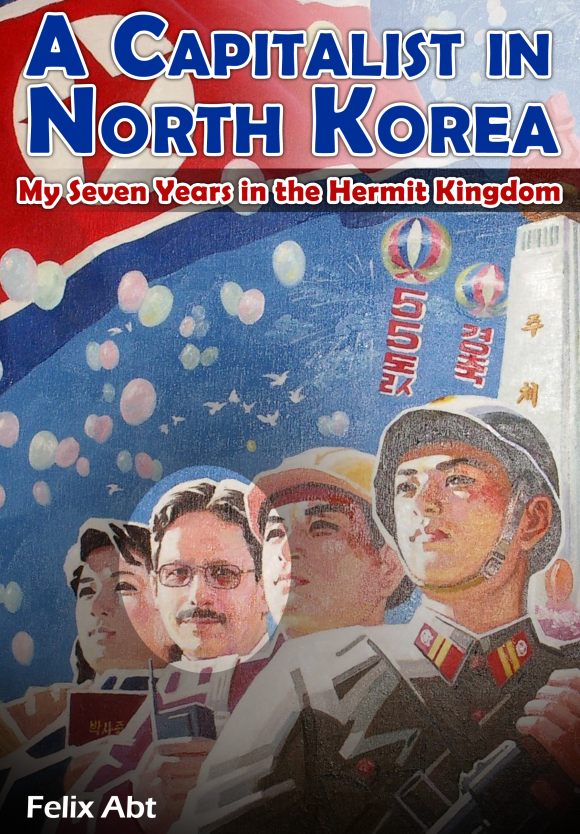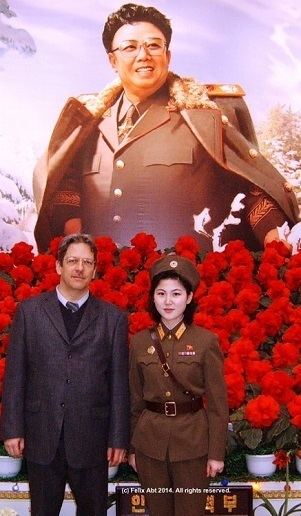A colossal mass demonstration, well choreographed to the level of ballet but with tens of thousands of participants in the centre of Pyongyang completed and sealed an important and unusual political event in this remote and isolated land of North Korea – the Party Congress. The demo has been followed by a show, so big that it could not be staged anywhere else. Magnificient fireworks, twenty thousand men and women dancing with torches in the darkness of Pyongyang night – this show I’ll remember forever. For the Koreans it was not a show, but a declaration of their loyalty to the state and the leader – or, perhaps, even for them it was just a night dance. Who knows?
A Party Congress is a rare bird in N Korea. Uncalled for many years, actually since 1980, the Congress, the top body of the ruling Workers’ Party, gathered to confirm consolidation of power in the hands of the new ruler, Kim Jong-Un, or Kim III, as Western media calls him. He was duly proclaimed the Party Chairman, the position previously held by his father Kim Jong-Il, and before him by his grandfather Kim Il-Sung.
The people were visibly excited to see the young Kim, and even passing by the tribunes they tried to linger and wave flowers and banners in his direction. Only rock stars get that much affection in the West. This is definitely a turning point: the hard bitter days are over, now things will improve.
The generation change is a tricky affair anywhere (the USSR failed it), but it seems that Kim III managed it successfully. He came to power after premature death of his father, a plump and soft-looking “Baby Kim”, with his Swiss schooling, an object of many South Korean jokes and scorn. But he has not been chosen and groomed and preferred over his two elder brothers by his father just for his kind appearance. The young Kim III pushed forward with modernisation of the country, with reshaping and rebuilding Pyongyang, with massive civil engineering projects, with improving the lot of his citizens – and with the nuclear program.
During first four years of his rule, North Korea became a full-fledged nuclear power, exploded an H-bomb last January, delivered a satellite to the orbit around the earth; living standards improved and mass housing program has been launched. Otherwise, Kim’s rule could be characterised by words “Continuity and Modernisation”.
Why the Party Congress has been assembled just now, what are the plans and ideas of Korean leadership, what can we expect from them? All the world was curious, so was I, and I eagerly (though with some trepidation) accepted their invitation. I have been exceedingly well received by these hospitable people, so I can dispel your fears: the North Koreans aren’t brainwashed zombies, but perfectly human, though they belong to a very distinct and different culture.
On a human level, they produce and drink very good beer. Whenever I had an occasion, I had a couple of beers with locals in a local pub, where all tried to offer me another mug of their perfect natural brew. The Koreans are cautious but not paranoid in their contacts with foreigners, and they are fond of beer.
There were a lot of bewildered journalists; they tried to gather what’s going on, afraid to miss a story but meeting a frustrating stonewalling. The N Koreans are indeed very secretive: to the last minute, we did not know when the Congress is about to finish, and what do they discuss. The BBC team has been deported from the country for reporting an upsetting gossip they probably invented or picked from the S Koreans.
By listening to some N Koreans and to diplomats stationed in Pyongyang, I learned that they expect that Kim will retire some of the old comrades and promote the younger lot, thus rejuvenating this unusual socialist state. Korea watchers noticed the possible rise of relatively young people who occupied lower rings of the hierarchy: Hwan Byon So, Tsoi Ren He, and the ideologist of the Party, Kim Gi Nam.
The theme of Continuity and Modernisation has been manifested even in Kim’s appearance: he appeared in a dark double-breasted jacket and an elegant light tie instead of Mao-style military wear usual for Korean officials. For the Koreans, this jacket was to remind of Kim I, his venerated grandfather, who first appeared in a very similar wear in the recently liberated Pyongyang. He was loth to appear in the Russian military uniform he donned previously, and preferred the civilian jacket.
This point has to be briefly elaborated. The Koreans are fiercely independent folk, ethnocentric to the extreme, nationalists for whom Korea is above all and the Koreans are a race apart. Actually, in this (and many other) aspect they are quite similar to the Japanese, their neighbours and former colonial masters for some forty years. But the Japanese went through seventy years of Americanization, westernization, liberalization and demilitarization after their defeat in 1945. The unreconstructed Koreans retained their national pride, so they are more similar to the Japanese of 1930s.
The Korean Communists came to power in the North thanks to the Red Army. After defeating the Japanese Army of Manchuria in August 1945, the Russians established a Communist government in Pyongyang, as was their wont in every capital they seized in the war. Their man was Kim Il Sung, at the time a Red Army mayor, and a native of Korea. [And famed guerrilla fighter against the Japanese—Ed]. But the Korean Communists did not remain in Moscow’s thrall for any length of time. By 1956, they became fully independent – and they re-wrote history to fit their ideas. In their version of history as taught in their schools and explained in their museums, they themselves liberated their country from the Japanese rule, while the Russians were of some valuable assistance.
(According to their version, they themselves defeated the Americans in the Korean war, while the Chinese and the Russians “had sent some volunteers”. This is annoying for the Russians and Chinese who bore the brunt of the war, but they understand the Korean feelings and bite the bullet without argument or complaint). [The Chinese and Russians contributed generously to the North Korean side, the Chinese with their army of "volunteers", which included Mao's own son, killed in that war, and the Russians with brave air force regiments, plus pilot training and AD training and equipment. Russian pilots often expertly contested the skies the Americans felt they owned due to numbers and superior technology. That said, it was North Korea that bore the brunt of the direct genocidal attacks by the US and its "allies", especially the air war, which included many incidents (as in Vietnam) easily classifiable as vicious war crimes. The US practiced biowarfare, for example, among other touches. This is all amply documented, but the majority of the US population remains in limbo, as usual, for reasons well known to our audience.—Ed]
Kim I in his jacket had been a potent symbol of Korean independence and of their own and unique way to their own brand of socialism. Kim III is very similar to his grandfather by portrait likeness, and even more so by his voice. The jacket of Kim was supposed to emphasize this similarity and continuity, while the elegant tie has been a tribute to modernity.
He promised to deliver “guns AND butter” to his citizens, i. e. to improve their lot while keeping the defence stance. More importantly, Kim had used the Party Congress and the universal interest it generated to call for peace with the US and his neighbours Japan and South Korea.
He said Korea is a responsible nuclear power; the Koreans will abide by the treaty of non-proliferation (NPT) as a nuclear power, meaning it will not share its nuclear military technology with non-nuclear states, and it will not use its nuclear weapons unless attacked by nuclear weapons. This is a message of peace-seeking: other nuclear states, the US, Russia and Israel do not promise to avoid using nuclear weapons even in case of a conventional attack.
“Kim sends a message of peace,” a high-ranking diplomat stationed in Pyongyang told me. “Alas, it was misunderstood or distorted by the news agencies. They quoted him out of context and provided misleading headlines, in order to demonise him.”
Kim called for nuclear disarmament, but a general one, not only for Korea. Indeed while signing the NPT, the nuclear powers undertook to strive for general nuclear disarmament and for creation of the world free of nuclear weapons. This undertaking remained a dead letter. The last Soviet president Mikhail Gorbachev made some steps in this direction, but the US used his idealism to increase the power gap between the two states.
Recently the US embarked on an ambitious program of total renewal of their nuclear facilities. Pentagon asked for the mindboggling sum of one trillion dollars for this program. At the same time, the US demands nuclear disarmament of N Korea referring to the same NPT they are in breach of. Since the NPT has been signed, some states became nuclear powers – Israel, India, Pakistan. What’s wrong with N Korea developing nuclear weapons? The Koreans speak of double standards and add: if other states will give up their nukes, so shall we.
A Russian diplomat in Pyongyang told me: perhaps we should accept the reality that DPRK became a nuclear power. It would not have happened if the US and South Korea did not threaten the North with war. Just a few months ago, the war in Korea seemed imminent, when the US and their S Korean allies, some four hundred thousand troops altogether, practiced the conquest of Pyongyang and elimination of the NK government. The N Koreans went ballistic, and I can’t blame them, – he said. – If we were now to land half a million soldiers in Cuba and begin to practice how to sack Washington and destroy the White House, the US fleet would come all over Cuba in a jiffy. But in Korea, the Americans just increased their involvement by bringing in a nuclear armed aircraft carrier. We definitely understand why N Korean leadership is worried.
This response is important because Russia and China supported the UN Security Council resolution imposing sanctions on N Korea. Now, apparently, the Russians have second thoughts. The relations between Russia and N Korea never were cordial: N Korea has been too independent for Moscow likes. Still, they were cool but friendly. The Russians supported the sanctions at China’s request. The Chinese supported the sanctions to ingratiate themselves with the US and with S Korea, an important business partner. There is an additional factor: possible unification of Korea.
At the Party Congress, the young leader of N Korea had called upon his S Korean counterpart: let us renew the old idea of uniting two halves of Korea, in one federated state. Germany and Vietnam had already united, we also can do it. The regime difference is not a hindrance: Communist China has reunited with capitalist Hong Kong under the slogan “one country – two regimes”.
The process of unification actually started in year 2000, when the S Korean president Kim Dae Jung visited Pyongyang and met with the N Korean leader Kim Jong Il. He had received that year’s Nobel Prize for Peace. They established a free trade zone, the trains crossed the DMZ border, visits and family reunification began. But the US, the occupying power of S Korea, hated the idea. The S Korean presidents supporting unification have been found dead or jailed. The present S Korean president is definitely against unification. In S Korea, one goes to jail for saying a good word about the North. It is considered “hostile communist propaganda”.
The Chinese do not mind this. Yes, in the Korean war they fought for the unification of Korea, but that was then. Now they do not need a strong and independent-minded neighbour, while united Korea with its Samsung, Daewoo, H-bomb and 80 million population will be definitely a very strong country. For Russia, this is not a consideration. Even an extra strong Korea is not a threat for them. They agreed with China and the US because they support the NPT. But perhaps this is the time to change some rules, they muse.

















 Just use the donation button below (yes, click on Sylvester the Kitty)—OR, just as easy, SCAN our QR code!
Just use the donation button below (yes, click on Sylvester the Kitty)—OR, just as easy, SCAN our QR code!